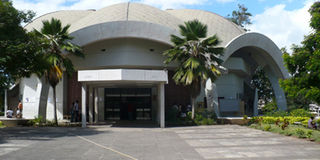More History programmes to be offered at the UDSM

What you need to know:
- The courses include Bachelor of Arts in Diplomatic and Military History and Bachelor of History and Archive Records Management, the university’s head of the History Department, Dr Oswald Masebo, said last week.
Dar es Salaam. The University of Dar es Salaam plans to launch more History degree programmes with the intentions of increasing job opportunities for students taking the subject.
The courses include Bachelor of Arts in Diplomatic and Military History and Bachelor of History and Archive Records Management, the university’s head of the History Department, Dr Oswald Masebo, said last week.
The programmes have already been approved by the Senate and their outlines have been sent to the Tanzania Commission for Universities (TCU) for approval.
Upon the TCU approval, each programme will accommodate a maximum of 50 students.
The courses would serve to reverse the declining trend of enrolment in the department, which has been considered as the back-up to education-based degrees for undergraduate students.
The department has the enrolment capacity of 60 students annually, but it received 20 students in the academic years 2014/15 and 2015/16.
“But the number has picked-up in this academic year (2016/17) as we have enrolled 40 students,” said Dr Masebo. He was speaking on the sidelines of the History Association of Tanzania (Hat) held at the UDSM.
Dr Masebo says some of the students who study the courses would be employed in various fields such as the army, the diplomatic service, but who wish to add knowledge. He revealed that preparation for the course modules have involved input from allied institutions including the Tanzania Peoples’ Defence Forces (TPDF) and Tourism Department.
He also said his department was determined to revive the Hat and to boost history as an academic discipline.
Currently, History is being taught in 40 higher learning institutions, 5,000 secondary schools and 10,000 primary schools.
The UDSM vice chancellor, Prof Rwekaza Mukandala, said the reduction in the number of students pursuing History has been attributed by the fear of missing employment opportunities.
He said most of the opportunities are yet to be exploited due to the shortage of experts with enough knowledge including on the fields of heritage tourism, records, academic and diplomatic.
“The establishment of these programmes is a strategy towards strengthening the stability of the History subject and academic excellence that will lead to more employment opportunities,” he noted
The 2016 Hat Conference was just a continuation of initiatives that started in 2015 just 25 years after collapsed in the 1990s after being introduced for the first time during the 1960s.




